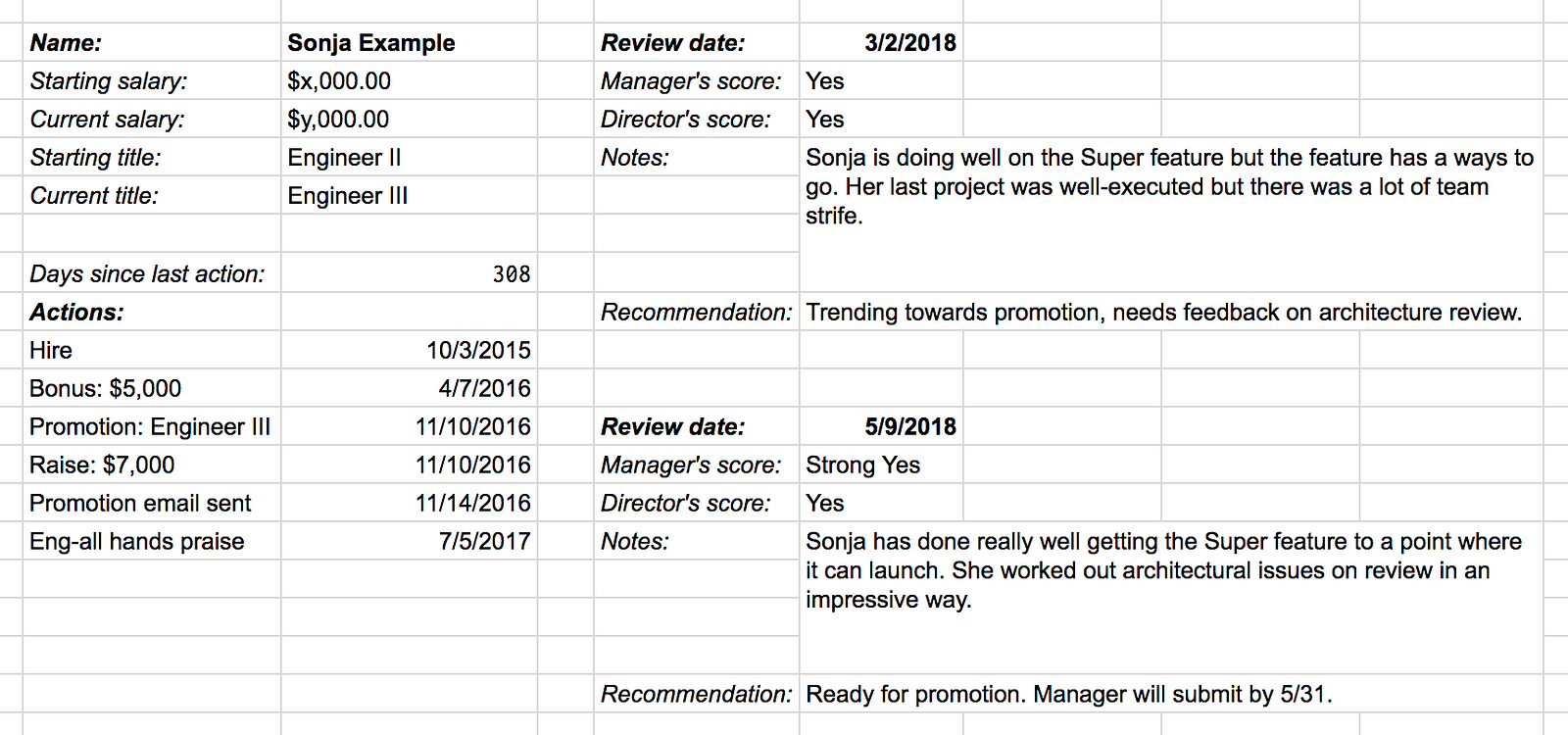A few years ago, I started doing team reviews with the managers I manage, and have found them very useful. A team review (sometimes called a talent review) is a regular practice of talking about every person a manager manages, and checking in on their performance, compensation, and management actions. I do them with each manager independently, every two months.
Team reviews are not at all hard to do. I spend about an hour with each manager and somewhat longer with each director. A Google spreadsheet with a tab per employee is totally sufficient tooling. (I’ve put up a template spreadsheet you can copy.) In each review, we go over:
- If we knew everything about this person that we know today—say, from a previous company—and they were interviewing now for their current role, how would we each score them as a candidate today (using the same scoring system we use for interviews: Strong Yes, Yes, No, Strong No)?
- Why did we give them that score? How has that score changed over the team reviews we’ve done for that person? What have we done to help those scores be positive?
- What have we done to act on this person’s performance? How long has it been since this person has been promoted, given a raise or a bonus, or been publicly praised? Are there any other actions we should be considering for them, such as directed feedback, a performance plan, or firing?

That’s it. For the interview score, the manager and I will each open the spreadsheet on our own laptops, and will type in our answers separately. When we’ve both answered, we press return at the same time to reveal our scores to each other. I encourage people not to look at past reviews before entering their current answer—instead, just go with your gut. There are a lot of valuable surprises that come out of these scores:
- If the manager and I differ on the score, we should talk about why. What are we both seeing and what should we be sharing about this person?
- If the scores have changed, especially dramatically, that leads to a good discussion. What happened? Did we want that to happen or not? What can we do to encourage or discourage it?
- Surprisingly often, consistent high scores don’t match up with management actions to recognize and reward that employee. “We’ve said Strong Yes for each of the last three reviews, and Yes for all the ones before that. Why hasn’t this person been promoted?”
- Less surprisingly, but just as worrisome, consistently low scores often don’t match up with management feedback or action. “This person has been at No for months now. What have we done to help them improve? Should we be looking at firing them?”
The output of each team review is a list of recommendations for the manager to pursue. If a team member is on a positive slope but not ready for a raise, we note that: “Trending towards a raise.” If we need to take a particular action, we make a list of those actions and set a date when they’ll be done. We keep notes in the spreadsheet so we’re tracking what we committed to do and why.
It’s easy for managers to fall into the trap of exception handling: spending a ton of attention on the biggest stars or the biggest problems on our teams. That leaves so many people without the attention and support they need. A team review forces you to consider and talk over everyone’s work, how that work is changing over time, and what you can be doing as a manager to ensure each person is either succeeding or leaving. It pushes managers to talk over their thoughts on their team much more regularly than annual reviews or a promotion process. It keeps people from falling through the cracks.
Team reviews are quick and easy to do, and every time I’ve done one, the manager and I wind up talking about important topics, pushing ourselves to promote and reward people who deserve it, and taking action where needed. It also helps me know our whole team better, and get clear signals from managers that make interactions with each person more meaningful. I highly recommend the practice.
Thanks to Alianor Chapman, Brad Greenlee, Julia Evans, Giovanni Fernandez-Kincade, Chris Dary, Selena Deckelmann, Camille Fournier, Raquel Vélez, Marco Rogers, Daniel Espeset, Alicia Liu, and Sarah Huffman for their feedback on this post.
